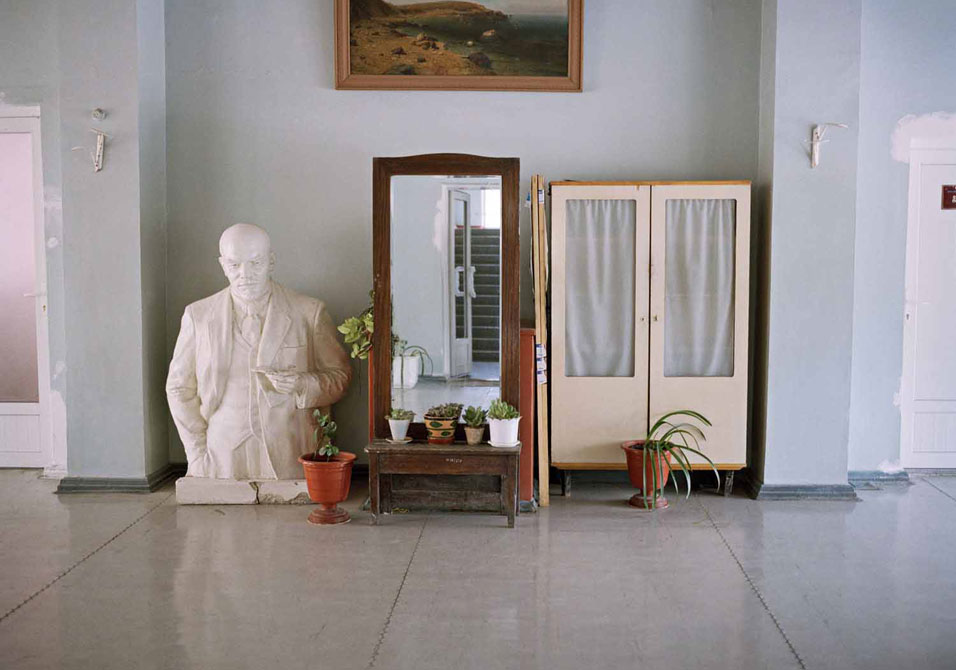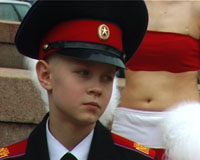Exhibit Examines Post-Soviet Russia through Photography, Video

In her first major solo exhibition, visiting professor of art Sasha Rudensky ’01, will present two photographic series at Wesleyan University’s Ezra and Cecile Zilkha Gallery: “Remains” (2004/08) and “Demons” (2007–08).
In “Remains,” Rudensky, who was born in Moscow in 1979 and moved to the United States in 1990, explores the political and social transformation of the former Soviet Union by poignantly focusing on the intimate details of everyday life. “Demons,” a series of hybrid portraits, suggests a fantastical version of the artist’s childhood.
Rudensky “Remains” in the fall of 2004 after receiving a Mortimer Hays Brandeis traveling fellowship. Her images, however, turned out to be very different than what she first intended to photograph.
“My proposal was to document mining towns in Siberia and the arctic north,” Rudensky says. “But having gotten there and after doing some preliminary shooting, I realized I didn’t want to simply document post-soviet devastation of depressed towns, that I had something much more personal to say. Most of the work in ‘Remains’ resulted from the eight months I spent there in 2004-5 while on the grant.”
Rudensky put the project on hold for two years, while earning a master’s degree of fine art from Yale University’s School of Art, graduating in 2008. A month ago, she returned to the “Remains” project, photographing in Russia and Ukraine. Six of these images are in current Zilkha exhibit.
Her other exhibit, “Demons,” is a portrait project that Rudensky began in 2007 at Yale.
“From the beginning of my time there I wanted to make a radical departure from what I knew and was comfortable with photographically, namely landscape and interior work, and attempt to make a portrait, one that really felt like my own,” she says. “I wanted to figure out a method that stood apart from the highly formal and clinical way of photographing people that has dominated contemporary photography, instead soliciting a real emotional commitment and engagement on the part of the viewer.”
The title “Demons” does not refer to the diabolical nature of Rudinsky’s subjects – though there is a vampire-esque presence to some of the characters.
“‘Demons’ is a reference to the idea of ‘my demons’ that I’m still battling, which is navigating a childhood that is largely based on exaggerated and perhaps even subconsciously created memories. It was very liberating to make work – to have the freedom to ‘stage’ pictures, and to shed the responsibility of creating a document.
The exaggerated, theatrical, operatic visual language which Rudensky chose “seemed appropriate considering that much of one’s remembrance of one’s past, especially if it’s one that’s linked to the mythology of a country that doesn’t even exist, is fictitious, and performative”
“This is my first show at Zilkha since my undergraduate thesis exhibition in 2001, so it’s great to be able to show in that beautiful luxurious space which is where it all began,” Rudensky says.

Russian artist Olga Chernysheva joins Rudensky at the Zilkha exhibit with her looped video projection titled, “March” (2005). Chernysheva’s films and photographs wryly scrutinize the post-Soviet experience. “March” observes the pomp and absurdity of a military-style celebration that includes boy guards, cheerleading pom-pom girls, and assorted local dignitaries in an often humorous exposé of the ornamentation of power.
Chernysheva has exhibited internationally including the Venice Biennale (2001); MoMA, New York (solo screening) (2008); and Lunds Konsthall, Sweden (2008).
The exhibit and video projection run Jan. 24 through Feb. 15. Gallery hours are Tuesday–Sunday, noon to 4 p.m.; and Friday noon to 8 p.m. The Ezra and Cecile Zilkha Gallery is located at 283 Washington Terrace in Middletown, Conn.For more information visit www.wesleyan.edu/cfa or call 860-685-3355.

